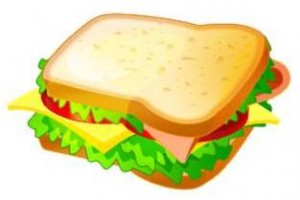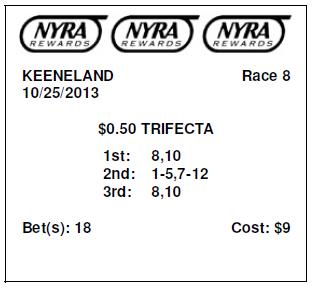Sandwich Play – A Trifecta Wagering Strategy
Most major racetracks in North America now offer a minimum Trifecta wager of only 50-cents. This lower minimum wager enables bettors to construct tickets that cover more horses and keep the cost of the tickets affordable. With this in mind, we’re going to introduce a Trifecta wagering strategy we call the “Sandwich Play.”
With the 50-cent Trifecta option, the Sandwich Play offers an affordable back-up to an Exacta wager. Exacta wagers require that you select the first and second place finishers in a race. Click here to review an article on making Exacta wagers. Well, after finishing first and third for the umpteenth time … and lamenting over some unexpected horse breaking up my Exacta … I decided to implement a strategy that would payout for a close-but-formally-no-cigar 1st and 3rd finish.
The main idea is to sandwich one or more horses between two (or more) “key” Exacta horses in a Trifecta play. For example, let’s say that #8 and #10 are your “key” horses. Furthermore, let’s assume you feel there are four horses with a chance of spoiling your 8-10 exacta; they are horses #1,#2,#3, and #4.
So let’s say you make a $5 Exacta box 8-10 … costing $10. Then you could make a 50-cent Trifecta sandwich play as follows:
8,10 with 1,2,3,4 with 8,10 for a total of $4.
The mathematics for a 2-key horse sandwich play are simple. TWO times the number of horses you’re sandwiching in the middle (4 in this example) times the amount of the bet (50-cents in this example).
Next, let’s say in the prior example you want to sandwich “all” of the horses in the middle and we’ll assume it’s a 10-horse field. You would call out your 50-cent wager as follows:
8,10 with ALL with 8,10 = 16 combinations x 50-cents = $8
Why 16 combinations (not 20) with it being a 10-horse field? Because the #8 and #10 are being singled in the 1st and 3rd position … so they cannot finish there AND finish in the 2nd position as well. That leaves 8 horses in the middle.
Now for a real world example using the “sandwich play” strategy that unfortunately (for the author) didn’t result in a big payout, but demonstrates the possibility just the same.
On October 25, 2013 the 8th race at Keeneland had a 12-horse field with one scratch (#6) for a total of 11 horses going into the gate. I thought the race was fairly wide open, but ended up deciding to make an exacta play with #8 (the 9-5 Favorite) and #10 (a 20-1 horse with lots of speed and upset potential). In addition to the exacta play, I made the following sandwich play.
I decided to make this an “ALL” play for the 2nd position because I really did think it was possible for any of the horses to spoil my 8-10 exacta box.
Well, as expected, #10 took the early lead and led for much of the race. Unfortunately, he tired late and did not hit the board. #8 took a brief lead in the stretch, but also tired late and finished third.
The final results were 5-11-8. So, here’s where it gets painful. #5 was on my short list of horses considered for the sandwich play and was only 7-1, where the #10 I used was 20-1. Right idea, wrong horse! Especially when I tell you that #11 (the sandwich horse in the middle) went off at odds of 99-1.
If the ticket displayed on the left had “5,8” instead of “8,10” in the first and third slots … well, this story would have had a happier ending!
So, below is the payout chart for the race. As you can see, the Trifecta paid $7,317.60 for a $2 ticket. Which pays $1,829 for a 50-cent ticket. Not bad for a $9 investment. Oh, well … right idea, wrong horse!

That gives you an idea of what’s possible with the sandwich play. Over the years I’ve cashed my share of these saver tickets, and sometimes they pay more than the main exacta ticket would have paid.
Now for an example that did payoff …
On August 25, 2014 in the 7th race at Saratoga, I had narrowed my selections down to three horses in the following order: #4 (5-1), #8 (7-2), and #1 (5-1). I did not like the favorite #6 (Benny’s Bullet) who was 5-2 on the board. After making my normal weighted wagers using my top three choices, I decided to make a 50-cent Trifecta Sandwich play using 4-8-1 in the 1st and 3rd positions. The wager looked like this:
4,8,1 with ALL with 4,8,1 = 36 combinations x 50-cents for total cost of $18.
Essentially this was a back-up bet that would cover me in the event I was correct about the 5-2 favorite (#6) running poorly, but missed a higher priced horse that might break up my exacta wagers. The payout chart below shows this turned out to be a good idea.
You can see that #7 (17-1) managed to get into the 2nd position. While I was disappointed that my exacta wagers were broken up, I was pleased that I was correct about taking a stand against the favorite, who ran next to last … and even more pleased that I cashed a Sandwich Play trifecta wager to compensate for my blown exactas.
Modeled after European style turf courses, come visit the only one of its kind in North America. The author had a truly enjoyable visit to this unique race course last year. Click here to read more about that adventure.
Saturday, September 13, 2014 will have four Stakes Races, including the Grade 3 Kentucky Turf Cup worth $600,000.





3 comments on “Sandwich Play – A Trifecta Wagering Strategy”